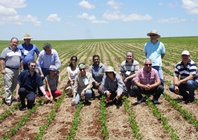Brazilian collaboration to combat Tan-Spot in wheat

Farm near Passo Fundo where precision agriculture is applied: L-R Lucio Jorge. Genei Dalmago, Jan Kim (front), Paulo Herrmann, Anyela Camargo-Rodriguez (in front), Gina Garzon Martinez; Anna Christian Albuquerque, Flavio Santana, Sandra Mansur, Luis Mur, Maurício Fernandes, Eduardo Caierão, Paulo Vargas.
21 March 2016
A team of scientists at Aberystwyth University’s IBERS (Institute of Biological, Environmental and Rural Sciences) is collaborating with world-leading EMBRAPA (Brazilian Agricultural Research Corporation) and the UK’s NIAB (National Institute of Agricultural Botany) to implement cutting edge imaging technologies and approaches to quickly identify Tan-Spot resistant wheat lines.
Farmers must prepare for a changed climate that is likely to feature more erratic weather patterns that will inevitably have an effect on the emergence and re-emergence of plant diseases.
One such disease is Tan-Spot which affects wheat crops worldwide, and being one of the main diseases affecting Brazilian and also US wheat production, is also an emerging threat to UK production. Under the most severe conditions, Tan-Spot can reduce wheat yields by up to 80%.
This transcontinental collaboration is led by the IBERS’ Dr Anyela Camargo Rodriguez and is supported by the UK’s BBSRC (Biotechnology and Biological Sciences Research Council); facilitating exchange visits by UK and Brazilian scientists and a recent international workshop at Embrapa Trigo (a branch of EMBRAPA) based in Passo Fundo, Brazil.
This workshop led to a series of commitments which will enable even closer collaboration between EMBRAPA and UK scientists, and opens up a brand new line of joint research in wheat between Brazil and Wales governments.
Dr Camargo-Rodriguez stated: “I am delighted that this project strengthens the links between Latin American and UK scientists to address questions that are mutually important. I expect this to be the first of many such exchanges”
This work revolves around the use of the IBERS based National Plant Phenomics Centre; a cutting edge resource that allows computer-assisted imaging of plants to accelerate the development of new crop varieties.
The IBERS-EMBRAPA-NIAB project represents how Aberystwyth University is making real differences to major global problems.
Dr Flávio Santana, a plant pathologist from Embrapa Trigo stated: “Our collaboration with UK scientists, from Wales, is only a few months old and we are already making impressive advances. I look forward to further developing these links over the coming months and years”.
AU11416



